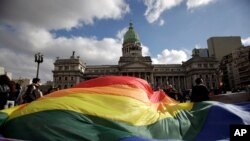At least 13 United Nations member states still criminalize transgender people, while others use morality and indecency laws to crack down on the trans community, a report showed on Wednesday.
Nigeria, Oman and Lebanon are among the nations with explicit anti-trans laws, according to the latest Trans Legal Mapping Report by LGBT+ rights group ILGA World.
The research details trans legislation and policies in 143 U.N. member states and 19 other jurisdictions.
Many other countries apply "seemingly innocuous" regulations covering offenses such as "public nuisance, indecency, morality [and] loitering" to police trans communities, the report said.
However, at least 96 U.N. member states now have provisions for legal gender recognition, according to the research.
Violations of trans rights occurred across the world, said ILGA World's director of programs Julia Ehrt.
"Some of the more shining nations when it comes to legal gender recognition are based in the global south, such as Argentina," she added.
Eight years ago, Argentina joined a handful of countries that let trans people change their gender on official identity documents without physical or psychological tests.
In Britain, there has been a ferocious debate in recent years over reforming the 2004 Gender Recognition Act, pitting some feminists against parts of the trans community.
The British government launched a consultation two years ago on overhauling the law to allow "self-ID" in England and Wales — a reform opponents said could allow predatory men access to women-only spaces such as toilets.
"In the UK, the debate is particularly fierce when you compare it with other debates in European states and I think [it] has, in a certain way, been exported to many of the other Commonwealth countries," Ehrt said.
The report also highlighted some positive developments for trans people over the past two years.
Nine countries have taken steps to make it easier for people to change their name and gender classification on official documents such as birth certificates since 2018.
British lawmaker Crispin Blunt, chairman of the All-Party Parliamentary Group on Global LGBT+ Rights, said the government's decision to scrap the "self-ID" proposal meant it was "a particularly wretched time in the UK."
"Britain continues to claim global leadership on LGBT+ rights but has just decided not to update its own processes," Blunt said.
"Now 25 nations, with more to follow, show us a better example of how to respect the basic human rights of trans and gender diverse people," he added.












